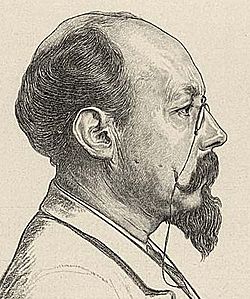Marcellus Emants facts for kids
Quick facts for kids
Marcellus Emants
|
|
|---|---|

Marcellus Emants (1897) by Theo Kerstel
|
|
| Born | Marcellus Emants 12 August 1848 Voorburg, Netherlands |
| Died | 14 October 1923 (aged 75) Baden, Switzerland |
| Resting place | The Hague, Netherlands |
| Occupation | Novelist, playwright, poet |
| Language | Dutch |
| Alma mater | Leiden University |
Marcellus Emants (born August 12, 1848 – died October 14, 1923) was a Dutch novelist (a writer of long stories). His books are important examples of a writing style called Naturalism in the Netherlands. His work helped start a new wave of Dutch literature around the 1880s, led by a group called the Tachtigers. His most famous book is A Posthumous Confession, which came out in 1894.
Contents
About Marcellus Emants' Life
Marcellus Emants was born on August 12, 1848, in Voorburg, Netherlands. His family came from The Hague and included many magistrates (officials who enforce laws). His father, Guilliam Balthasar Emants, was a judge.
Early Education and Studies
Marcellus went to a special high school called hogereburgerschool in The Hague. After finishing school in 1868, when he was 20, he started studying Law at Leiden University. He studied law because his father wanted him to.
However, Marcellus loved the arts much more than law. He enjoyed music (playing the cello), drawing, theatre, and literature. He didn't join the usual student groups at university. Instead, he started a literary club called Quatuor with friends from The Hague. His first writings were published in their club's magazine.
Becoming a Writer and Traveler
In 1871, his father passed away. This meant Marcellus became financially independent. He decided to stop his law studies and travel the world. He especially loved the Alps mountains and visited them every year.
In 1872, he wrote an essay called Bergkristal van Oberammergau (Mountain crystal of Oberammergua). This was about the Passion plays he saw there. People liked his writing, and he continued to travel. He developed a unique style of travel writing that was much more than just a travel diary.
Writing Style and Influence
Marcellus Emants believed that art should be independent, just like the Tachtigers (a group of influential Dutch writers from the 1880s). However, he didn't join their group because he preferred a simpler writing style. He once said he wanted readers to notice the words as little as possible.
Despite his simple style, a leading Tachtigers writer, Willem Kloos, called him "the Johannes Baptista of modern literature." This meant Emants helped prepare the way for new literary ideas.
Emants' writing was clear and often had a serious, sometimes sad, view of life. He admired writers like Émile Zola, Hippolyte Taine, and Ivan Turgenev. He even wrote letters to Ivan Turgenev.
Work on Spelling Reform
Marcellus Emants was interested in making Dutch spelling simpler. He was the vice-president of a group called the "Society for the Simplification of our Spelling." He also attended a government meeting about changing Dutch spelling. Even though the changes weren't made right away, they were put into practice 11 years after his death.
Later Life and Passing
During the First World War, Emants felt stuck in the Netherlands. After the war ended, he planned to move to Switzerland. On March 2, 1920, he left The Hague for good. He spent his last years in Switzerland, staying in hotels, spa towns, and special health centers called sanatoria.
Soon after moving, he became ill with shingles and then had several strokes. He passed away on October 20, 1923, in a hotel in Baden. He was buried in The Hague.
Marcellus Emants' Family Life
Marcellus Emants was married three times.
- His first wife was Christina Magdalena Prins, a distant cousin. They married in 1873, but she sadly passed away two years later in 1875.
- On July 10, 1880, he married Eva Vemiers van der Loef. She also wrote a novel in 1887 under the pen name Nessuno. Eva died in 1900.
- On July 5, 1904, he married Jenny Kühn, a German actress. This marriage was difficult, but they had a daughter named Eva Clara Jenny. Marcellus loved and spoiled his daughter very much. She later changed her name to Lillith, inspired by one of his works from 1879.
Books in English
- Marcellus Emants: A posthumous confession. Translated from Dutch by J.M. Coetzee. New York, 2011. ISBN: 9781590173473
See also
 In Spanish: Marcellus Emants para niños
In Spanish: Marcellus Emants para niños

